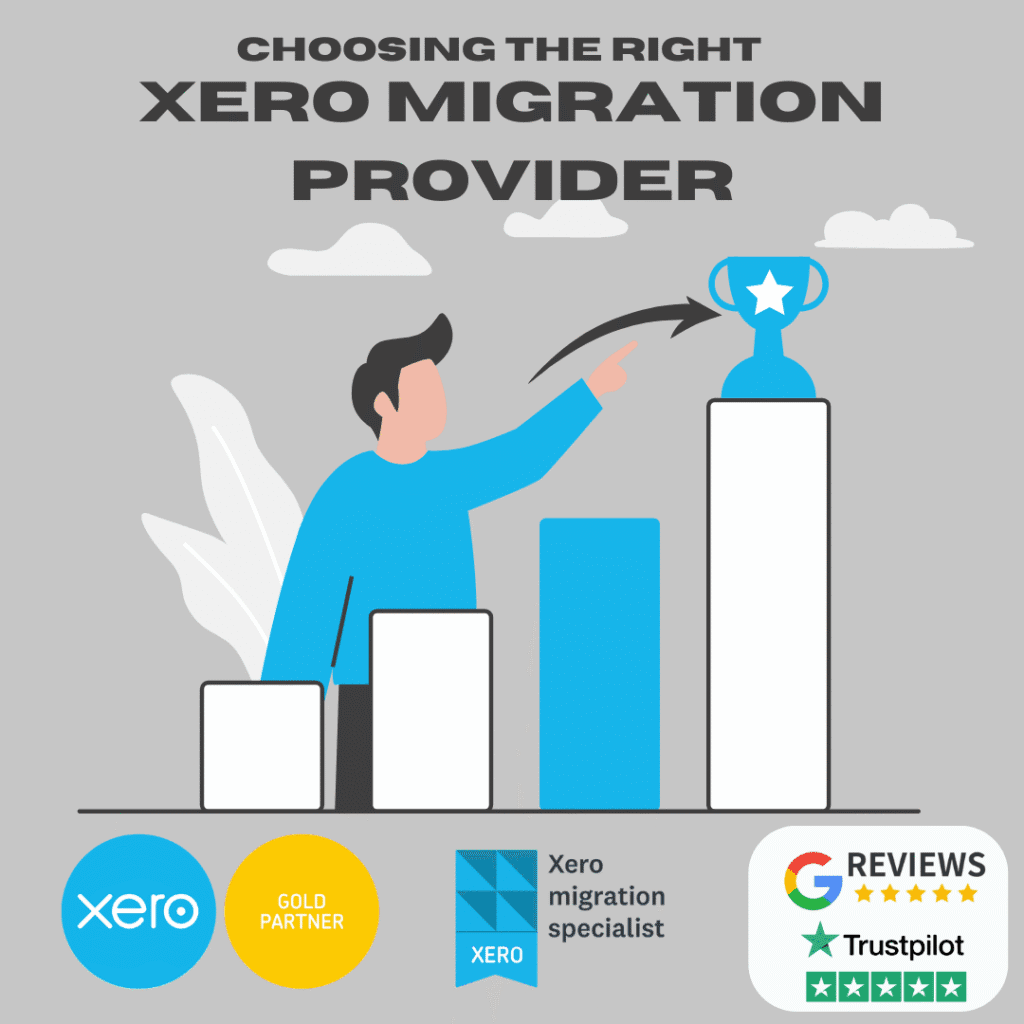How to Choose the Right Xero Migration Provider: What to Ask, What to Avoid, and Why It Matters
Migrating your accounts to Xero is a smart move. You gain efficiency, visibility, and better reporting. But getting there? That’s where the real challenge lies. How to choose your Xero Migration Provider?
One of the most overlooked—but most critical—decisions in the process is choosing the right data migration provider. At Migrate My Accounts, we’ve seen firsthand what goes wrong when this step is rushed or based on vague sales promises.
If you’re currently exploring Xero conversion or data migration, here’s our no-fluff guide on what to ask, what to look for, and what to absolutely avoid.
1. Experience Is Everything: Look Beyond the Sales Pitch
You wouldn’t hire an accountant without experience in your industry, so don’t settle for a migration provider without a proven track record.
✅ Look for:
- Reviews, both on and off their website
- Case studies or real migration scenarios
- Testimonials from businesses like yours
- Proof of prior Xero migrations across a range of industries
⚠️ Be cautious of big claims with no evidence. We’ve seen providers throw flashy numbers around, but can’t provide a single meaningful case study.
Pro tip: Ask them directly to walk you through a successful migration, from start to finish. It’ll become clear very quickly how hands-on and knowledgeable they are.
2. Understand Their Process: Timelines, Steps, and Who Does What
Xero data migration isn’t just about transferring figures. It’s about accurately translating financial history, making structural adjustments (like chart of accounts restructuring), and ensuring data integrity.
Here’s what to ask:
- What are the exact steps involved in the migration?
- How long will the process take—from planning to go-live?
- Who will be handling my migration? Are they Xero certified or experienced?
A solid provider should be able to explain their migration process clearly and show how they reduce downtime and limit disruption. For reference, a well-planned migration should take between 2 to 5 working days, depending on the complexity and whether data cleansing or restructure is needed.
3. Ask for Industry-Specific Experience—and How They Handled Challenges
Every business is different, and data risks vary massively by industry. A provider who’s handled retail may not be prepared for the nuance of non-profits or international e-commerce setups.
Ask:
- Have you encountered data migration issues in industries like mine?
- How did you resolve them?
- What were the risks, and how were they mitigated?
If they can’t answer confidently or give a vague “we’ve done loads” response without detail, be wary.
At Migrate My Accounts, we document every tricky case—from missing historical tax data to currency mismatches—and create standard workarounds to apply in future projects.
4. Reconciliation and Reporting: Non-Negotiables
One of the most common post-migration issues we’ve seen when clients come to us for second opinions is unreconciled data and missing audit trails.
You should ask:
- How do you reconcile the data between the old system and Xero?
- Do you provide a report of discrepancies and matched totals?
- What reports will I receive post-migration?
A good migration provider offers a structured reconciliation process, typically including:
- Opening and Ending balances checks
- Debtor and creditor reports
- Bank balance and statement match
- Contact base reconciliations
- Period differences audit trail
These are not “nice-to-haves.” They’re essential for audit-proof bookkeeping.
5. Audit Support: Set Expectations in Writing
Many businesses only realise too late that their provider doesn’t support them during audits. Don’t be left scrambling.
Make sure:
- Your engagement agreement includes audit support.
- The provider explains how they’ll assist if HMRC or your accountant flags discrepancies.
- You’re provided with full migration logs and backup files.
Unfortunately, we’ve seen clients come to us months after a rushed migration, struggling to justify data to auditors because the provider disappeared post-project. That should never happen.
Final Thought: It’s More Than a Technical Task
Choosing the right Xero migration provider isn’t about ticking a box. It’s a partnership. You need someone who understands your data, your reporting needs, your business goals—and your audit requirements.
Ask the hard questions. Demand transparency. And never settle for a vague process or an impressive logo wall with no real client stories behind it.
✅ Want a Migration Without the Risk?
At MigrateMyAccounts.co.uk, we specialise in:
- Xero migrations for SMEs, Multi-entity growing businesses and accountants
- Industry-specific data restructuring
- Full reconciliation reports
- Audit-ready documentation included by default
- Human support, not just tools
Systems we migrate from are Sage 200 to Xero, Access to Xero, Exchequer to Xero, Dynamics to Xero, Business Central to Xero, and many more .
Related Resources
The ultimate guide to successful Xero data migration
Check the Best migration tools and learn more about data migration.
Contact us at info@migratemyaccounts.co.uk
Migrate My Accounts is a Xero Gold Migration Partner. We know all migration truths.
Check our Google reviews or TrustPilot reviews.
👉 Contact us today for a free consultation, and let’s talk about migration requirements .


